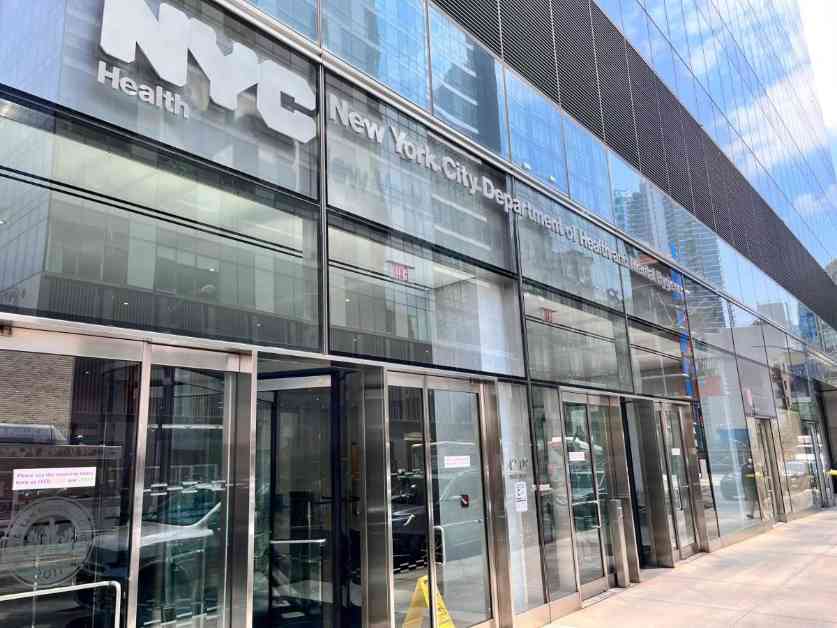Rise in Mysterious Pox Cases in NYC During August
The New York City Department of Health and Mental Hygiene has reported a concerning rise in mysterious pox cases in the city during the month of August. After a decrease in cases over the past few months, there has been a resurgence of pox cases, with 41 reported in August, up from 33 in July and 36 in June. This uptick is alarming and has raised concerns among health officials and the community.
The majority of the cases reported in August were among queer men, according to a city health official. This trend is consistent with previous outbreaks that primarily affected men who have sex with men. The city updates its numbers on a monthly basis, with limited data for September showing a total of five cases in the first week of the month.
The pox cases in New York City are part of the same strain, Clade II, that has been circulating since the 2022 outbreak that affected men who have sex with men. A more deadly strain, Clade I, has been spreading in central African countries, although no cases of this strain have been identified in the United States so far. The World Health Organization has declared the pox outbreak in central Africa a global health emergency, prompting concerns about the spread of the disease.
Dr. Ashwin Vasan, New York City’s health commissioner, emphasized the importance of vaccination in combating the spread of the disease. The Jynneos vaccine, administered in two doses 28 days apart, provides protection against both Clade I and Clade II. Vasan urged New Yorkers to complete the full vaccine regimen to ensure maximum protection against the disease.
Despite the availability of the vaccine, many individuals have yet to return for their second dose, posing a challenge to efforts to control the outbreak. To address this issue, the city Health Department issued a reminder to New Yorkers to get their second dose of the vaccine, regardless of the time that has passed since the first dose. In an effort to increase vaccination rates, New York State Health Commissioner James McDonald signed an order allowing pharmacists to administer the pox vaccine without a prescription.
While the outbreak was declared over in February 2023, there has been a resurgence of cases in the city since last year. The city issued an advisory to medical providers warning of a substantial increase in cases dating back to October of the previous year, with 256 cases reported between that time and April 2024. This resurgence underscores the importance of ongoing vigilance and vaccination efforts to prevent further spread of the disease.
According to the Centers for Disease Control and Prevention, the pox vaccine is recommended for individuals who have had known or suspected exposure to the disease, have had a sex partner diagnosed with pox, are at a higher risk due to their sexual behavior or occupation, or have had potential exposure in high-risk settings such as sex clubs or bathhouses. New Yorkers can visit vaccinefinder.nyc.gov to find locations offering the vaccine in the city.
Impact of the Resurgence
The resurgence of pox cases in New York City has raised concerns among health officials and the community. The increase in cases, particularly among queer men, highlights the ongoing challenges in controlling the spread of the disease. Health officials are urging individuals to get vaccinated and complete the full regimen to protect themselves and others from infection.
The rise in cases comes amid efforts to combat the spread of the disease and ensure access to vaccinations for those at risk. The availability of the Jynneos vaccine and the recent order allowing pharmacists to administer the vaccine without a prescription are aimed at increasing vaccination rates and preventing further outbreaks. However, the challenge remains in ensuring that individuals return for their second dose to achieve maximum protection against the disease.
The impact of the resurgence of pox cases extends beyond the immediate health concerns to the broader public health implications. The outbreak in central Africa has been declared a global health emergency, underscoring the need for coordinated efforts to control the spread of the disease. Health officials are working to educate the public about the risks of pox and the importance of vaccination in preventing further outbreaks in the community.
Prevention and Vaccination Efforts
In light of the rising cases of pox in New York City, health officials are emphasizing the importance of prevention and vaccination to control the spread of the disease. The Jynneos vaccine is a key tool in protecting individuals at risk and preventing further outbreaks in the community. Completing the full two-dose regimen is essential for maximum protection against both Clade I and Clade II strains of the disease.
New Yorkers are urged to educate themselves about the risks of pox and take steps to protect themselves and others from infection. Vaccination is a critical component of preventing the spread of the disease and reducing the risk of transmission in high-risk settings. By getting vaccinated and completing the full regimen, individuals can help prevent the spread of pox and protect the health of the community.
In conclusion, the rise in mysterious pox cases in New York City during August highlights the ongoing challenges in controlling the spread of the disease. Health officials are urging individuals to get vaccinated and complete the full regimen to protect themselves and others from infection. The availability of the Jynneos vaccine and efforts to increase vaccination rates are key steps in preventing further outbreaks and ensuring the health and safety of the community.
